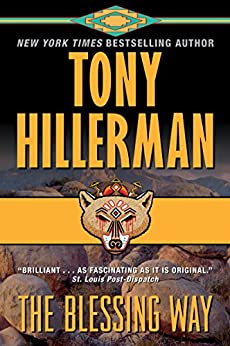More on this book
Community
Kindle Notes & Highlights
THAT NIGHT THE Wind People moved across the Reservation. On the Navajo calendar it was eight days from the end of the Season When the Thunder Sleeps, the 25th of May, a night of a late sliver of moon. The wind pushed out of a high-pressure system centered over the Nevada plateau and carved shapes in the winter snowpack on San Francisco peaks, the Sacred Mountain of Blue Flint Woman. Below, at Flagstaff airport, it registered gusts up to thirty-two knots—the dry, chilled wind of high-country spring.
Leaphorn insisting that there was a basis of truth in the Navajo Origin Myth, that some people did deliberately turn antisocial, away from the golden mean of nature, deliberately choose the unnatural, and therefore, in Navajo belief, the evil way.
Canfield took the turquoise frog from his pocket and rubbed it, chuckling. “I’ll say it’s a witch,” he said, “because this keeps me safe from witches.” Actually, McKee remembered, the turquoise shape wasn’t a Navajo charm. It was a much older Anasazi fertility totem with nothing at all to do with witches. Of course it didn’t really matter.
Sandoval approved of this, knowing that the policeman would get around to his business in good time and appreciating that here was a young one who knew the old and patient ways.
“He acted like he had no relatives,” Leaphorn thought and grinned wryly at the old-fashioned expression. When he was a boy, it was the worst thing his mother could say about anyone. But then the Navajo Way made the relatives totally responsible for anything one of the family did. Now that was changing and there were more young men like Horseman. Souls lost somewhere between the values of The People and the values of the whites. No good even at crime.
Over the fire, Sandoval would be singing the old chants, the old songs to the Holy People—not prayers of humility or supplication, and not pleas for forgiveness, but songs which sought nothing but to restore man’s harmony with all that was elemental.
The chanting had started at the fire again, another sway dance. This time the song was old, a pattern of rhythmic monosyllables which had lost coherent meaning somewhere in time.
Interesting idea of how language is lost over time, unquestioned, but still valued and used; perhaps the mystic is simply losing knowledge of the past.
Instead he expected order—the natural sequence of behavior, the cause producing the natural effect, the human behaving in the way it was natural for him to behave. He counted on that and upon his own ability to sort out the chaos of observed facts and find in them this natural order.
Leaphorn knew from experience that he was unusually adept at this. As a policeman, he found it to be a talent which saved him a great deal of labor. It was a talent which, when it worked unusually well, caused him a faint subconscious uneasiness, grating on his ingrained Navajo conviction that any emergence from the human norm was unnatural and—therefore—unhealthy.
There was no trace left of the nagging sense of wrongness and urgency that had dogged him for days, none of that vague, undefined feeling that something unnatural and evil was afoot in his territory. He understood now. It was a good feeling.
But Navajos didn’t hurry. In fact, there was no word in the Navajo language for time.
Navajos did not kill with cold-blooded premeditation. Nor did they kill for profit. To do so violated the scale of values of The People. Beyond meeting simple immediate needs, the Navajo Way placed little worth on property. In fact, being richer than one’s clansmen carried with it a social stigma. It was unnatural, and therefore suspicious.
Eddie’s ghost would be a greedy one, McKee thought, always coveting material possessions—the Navajo ultimate of unnatural wickedness.


